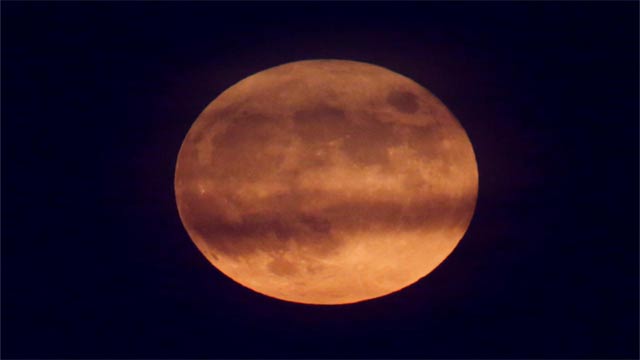WASHINGTON – As part of a new US-sponsored international agreement called Artemis Accords, the Trump administration is preparing a legal lunar abatement familiar with the proposed deal. The deal will be the latest attempt to forge alliances around NASA’s proposal to bring people and space stations to the moon in the next ten years. The civilian space agency is playing a growing role in the enforcement of American foreign policy. The draft contract was also not officially communicated to U.S. allies.
The Trump Administration and other space countries consider the moon to be a crucial strategic capital for space. The moon is also important for long-term scientific exploration, which could enable potential missions to Mars activities that fall within a widely regarded obsolete international space law.
The Artemis Agreements, named after the National Aviation and Space Agency’s current Artemis lunar plan, propose “security zones” that surround potential lunar bases to avoid damage or interference from neighboring countries or nearby companies. The pact is also designed to provide a foundation for companies to control the minerals they mine under international law. US officials expect to officially negotiate the deals with space partners such as Canada, Japan, and European countries and the United Arab Emirates in the coming weeks, and to begin negotiations with countries that the Trump administration believes have “like-minded” interests in moon mining. Russia, a major NASA collaborator on the International Space Station, will not participate in such negotiations early, according to sources, as Moscow is increasingly viewed by the Pentagon as aggressive to conduct “threatening” satellite maneuvers against US spy satellites in Earth orbit.
The United States is a member of the 1967 space treaty and regards the “security zones” as one of their much-discussed articles that is being enforced. It is pointed out that celestial bodies and the moon “are not subject to sovereignty, use, occupation or other means of national appropriation”. “It’s not a territorial claim,” said a source who asked for anonymity to discuss the contract. Security zones – the size of which would vary depending on the mission – would allow space actors to work together without legally claiming territories, he said. “The theory is that if you intrude on someone’s operations and have identified those security zones around them, you need to get in touch, communicate, and figure out how to do it safely with everyone.”
ARTEMIS AS “NATIONAL POWER”
The Artemis Agreements are part of the Trump administration’s attempt to forego the United Nations treaty process and then reach agreement with “like-minded countries”, also because a treaty process would take too long and cooperation with non-space travel countries would be unproductive would. Management would be unproductive. As countries begin to see space as a new military area, the US-led agreement also points to NASA’s increasing position as an instrument of American diplomacy and is likely to fuel controversy among Washington’s space competitors like China.
NASA’s all about science and technology and exploration, which are critically relevant but I think the perception that NASA is a diplomatic tool is less popular,” said NASA Administrator Jim Bridenstine on Tuesday
The main thing is that countries around the world want to be part of it. This is the dimension of national strength, ”said Bridenstine. This participation in the Artemis program depends on the countries adhering to the norms of behavior that we expect in space. NASA is investing tens of billions of dollars in the Artemis program, which provides for people to be brought to the moon by 2024 and then create a “sustainable footprint” on the south lunar pole, with private companies being able to mine rock and underwater rocket fuel transformed
In 2015, the United States passed a law that gives companies ownership of the resources they mine in space. However, there are no such rules in the international community. Joanne Gabrynowicz, editor-in-chief of the Journal of Space Law, said an international agreement must be reached before “any form of exclusive research area or for any reason” is announced. “No nation can do something unilaterally and still have to have it legally,” she said.
خصوصی: ٹرمپ انتظامیہ نے آرٹیمیس مون معاہدے کا مسودہ تیار کیا
واشنگٹن – امریکہ کے زیر اہتمام ایک نئے بین الاقوامی معاہدے کے حصے کے طور پر جس کا نام ارٹیمیس ایکارڈز ہے ، ٹرمپ انتظامیہ مجوزہ معاہدے سے واقف ایک قانونی قمری قلت کو تیار کررہی ہے۔ یہ معاہدہ ناسا کے اگلے دس سالوں میں لوگوں اور خلائی اسٹیشنوں کو چاند پر لانے کی تجویز کے ارد گرد اتحاد کرنے کی تازہ ترین کوشش ہوگی۔ سویلین خلائی ایجنسی امریکی خارجہ پالیسی کے نفاذ کے لئے بڑھتے ہوئے کردار ادا کر رہی ہے۔ معاہدے کے مسودے کو سرکاری طور پر امریکی اتحادیوں کو بھی نہیں بتایا گیا تھا۔
ٹرمپ انتظامیہ اور دیگر خلائی ممالک چاند کو خلاء کے لئے ایک اہم تزویراتی سرمایہ سمجھتے ہیں۔ چاند طویل مدتی سائنسی تحقیق کے لئے بھی اہم ہے ، جو مریخ کی سرگرمیوں کے ممکنہ مشنوں کو قابل بناتا ہے جو ایک وسیع پیمانے پر متروک بین الاقوامی خلائی قانون میں آتا ہے۔
نیشنل ایوی ایشن اینڈ اسپیس ایجنسی کے موجودہ آرٹیمیس قمری منصوبے کے نام سے منسوب آرٹیمیس معاہدوں میں ، “سیکیورٹی زون” کی تجویز پیش کی گئی ہے جو پڑوسی ممالک یا قریبی کمپنیوں کے نقصان یا مداخلت سے بچنے کے لئے ممکنہ قمری اڈوں کے آس پاس ہیں۔ یہ معاہدہ بین الاقوامی قانون کے تحت معدنیات سے متعلق معدنیات پر قابو پانے کے لئے کمپنیوں کو ایک بنیاد فراہم کرنے کے لئے بھی ڈیزائن کیا گیا ہے۔ امریکی حکام توقع کرتے ہیں کہ آنے والے ہفتوں میں خلائی شراکت داروں جیسے کینیڈا ، جاپان ، اور یورپی ممالک اور متحدہ عرب امارات کے ساتھ معاہدے پر باضابطہ طور پر بات چیت کی جائے ، اور ایسے ممالک کے ساتھ بات چیت کا آغاز کریں گے جن کے بارے میں ٹرمپ انتظامیہ کا خیال ہے کہ چاند میں “ہم خیال” مفادات ہیں کان کنی. ذرائع ابلاغ کے مطابق ، روس ، بین الاقوامی خلائی اسٹیشن کا ناسا کا ایک اہم ساتھی ابتدائی طور پر اس طرح کے مذاکرات میں حصہ نہیں لے گا ، کیونکہ ذرائع ابلاغ کے مطابق ، پینٹاگون کے ذریعہ ماسکو کو زمین کے مدار میں امریکی جاسوس مصنوعی سیاروں کے خلاف “دھمکی آمیز” مصنوعی سیارہ چال چلانے کے لئے جارحانہ خیال کیا جارہا ہے۔
ریاستہائے متحدہ امریکہ 1967 کے خلائی معاہدے کا ممبر ہے اور ان کے زیربحث آنے والے مضامین میں سے ایک کے طور پر “سیکیورٹی زون” کا احترام کرتا ہے جس کو نافذ کیا جارہا ہے۔ اس طرف اشارہ کیا گیا ہے کہ آسمانی جسمیں اور چاند “خودمختاری ، استعمال ، قبضے یا قومی تخصیص کے دیگر ذرائع سے مشروط نہیں ہیں”۔ “یہ علاقائی دعوی نہیں ہے ،” ایک ذریعہ نے بتایا جس نے معاہدے پر تبادلہ خیال کرنے کے لئے اپنا نام ظاہر نہیں کیا۔ انہوں نے کہا کہ سیکیورٹی زون – جس کا سائز مشن کے لحاظ سے مختلف ہوگا – خلائی اداکاروں کو بغیر قانونی طور پر علاقوں کا دعوی کرنے کے ساتھ مل کر کام کرنے کا موقع فراہم کرے گا۔ “تھیوری یہ ہے کہ اگر آپ کسی کی کارروائیوں میں دخل اندازی کرتے ہیں اور اپنے آس پاس کے حفاظتی زونوں کی نشاندہی کرتے ہیں تو آپ کو رابطے میں رہنے ، بات چیت کرنے اور ہر ایک کے ساتھ اسے محفوظ طریقے سے کرنے کا طریقہ معلوم کرنے کی ضرورت ہے۔”
آرٹیمیس “قومی طاقت” کے طور پر
آرٹیمیس معاہدے اقوام متحدہ کے معاہدے کے عمل کو روکنے اور پھر “ہم خیال ممالک” کے ساتھ معاہدہ کرنے کی ٹرمپ انتظامیہ کی کوشش کا ایک حصہ ہیں ، کیونکہ اس معاہدے کے عمل میں بہت لمبا وقت لگے گا اور غیر خلائی سفر والے ممالک کے ساتھ تعاون غیر نتیجہ خیز ہوگا۔ . انتظام غیر نتیجہ خیز ہوگا۔ جب ممالک خلا کو ایک نئے فوجی علاقے کے طور پر دیکھنا شروع کرتے ہیں تو ، امریکہ کی زیرقیادت معاہدہ بھی امریکی سفارت کاری کے ایک آلے کے طور پر ناسا کی بڑھتی ہوئی پوزیشن کی طرف اشارہ کرتا ہے اور اس کا امکان ہے کہ چین جیسے خلائی حریفوں کے درمیان تنازعہ کو ہوا دے۔
اصل بات یہ ہے کہ دنیا بھر کے ممالک اس کا حصہ بننا چاہتے ہیں۔ یہ قومی طاقت کی جہت ہے ، ”برزنسٹائن نے کہا۔ آرٹیمیس پروگرام میں اس شراکت کا انحصار ان ممالک پر ہے جو ہم خلا میں توقع کرتے ہیں کہ طرز عمل کے اصولوں پر عمل پیرا ہیں۔ ناسا آرٹیمیس پروگرام میں دسیوں اربوں ڈالر کی سرمایہ کاری کررہا ہے ، جس میں 2024 تک لوگوں کو چاند پر لانے اور پھر جنوبی قمری قطب پر ایک “پائیدار نقش” بنانے کی سہولت دی گئی ہے ، نجی کمپنیاں چٹان اور پانی کے اندر موجود راکٹ کو کان بنانے میں کامیاب ہیں۔ ایندھن تبدیل
2015 میں ، ریاستہائے متحدہ امریکہ نے ایک قانون منظور کیا جس کے تحت کمپنیوں کو خلا میں کانوں کے وسائل کی ملکیت مل جاتی ہے۔ تاہم ، عالمی برادری میں اس طرح کے کوئی قواعد موجود نہیں ہیں۔ جرنل آف اسپیس لاء کے چیف ایڈیٹر جوآن گیبرینیوچ نے کہا کہ “کسی بھی طرح کے خصوصی ریسرچ ایریا یا کسی بھی وجہ سے” کا اعلان ہونے سے پہلے ایک بین الاقوامی معاہدہ طے کرنا ہوگا۔ انہوں نے کہا ، “کوئی بھی قوم یکطرفہ طور پر کچھ نہیں کر سکتی اور پھر بھی اسے قانونی طور پر رکھنا ہے۔






















